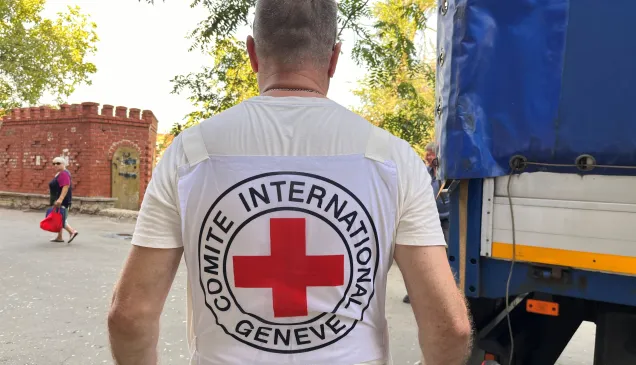ICRC President: “Why upholding the rules of war matters everywhere”

In a new interview with CGTN America, ICRC President Mirjana Spoljaric delivers an urgent appeal for states to show political will to uphold international humanitarian law (IHL) to halt the suffering of civilians in today’s wars. From Gaza to Ukraine to Sudan, she stresses that atrocities and disregard for IHL are shattering lives - and that political will is essential to reverse this.
Gaza: “It’s going to break our souls”
Ms Spoljaric describes the devastation she has witnessed in Gaza:
“The situation in Gaza surpasses anything you would consider to be humane, legally acceptable, or in the logic of military objectives… I have seen for myself the abhorrent suffering of the children, of the civilians… exposed and stripped of their human dignity. We cannot continue watching this. It’s going to break our souls. It’s going to haunt us. We need to stop this. We need a ceasefire in Gaza.”
She underscores that aid can only save lives when access is enabled:
“It’s not difficult to bring in aid, where there’s a political will to enable that, and when there is a political will to make sure that the aid reaches those who need it. Aid isn’t something you just drop in a place and leave for the fittest to grab. That’s not the point.”
Ukraine and Sudan: We cannot have wars without limits
Turning to other conflicts, Spoljaric warns of the human cost of a war of attrition in Ukraine - “tens of thousands of people have been sacrificed” - and calls negotiation the only way to end it.
On Sudan, she highlights that this is “the biggest humanitarian tragedy at the moment in terms of size,” with millions displaced and civilians facing rape, killings, and denial of food and health care.
“Those who conduct hostilities have to instruct their forces not to rape women, not to kill children, not to deny food, water and the essentials - especially healthcare - to the civilian populations. The war is bad enough as it is, but you cannot have limitless wars - not everything is allowed in a war. We don’t prevent wars, but we call upon on states and non-state armed groups to respect the rules that were designed and ratified by all states to prevent the worst. And raping a woman is the worst. Killing a child is the worst. It’s never allowed."
The rules of war: essential for all
Ms Spoljaric insists that weakening respect for IHL endangers everyone:
“If states accept that the laws that fundamentally protect our own people are hollowed out, it is a question of time until their own people find themselves in a situation where those putting them under pressure will say: ‘There are no rules, anything is allowed.’ It’s a very dangerous development that we have to reverse.”
She urges leaders to use their influence not only against adversaries but also with allies: “It’s not about denouncing your enemies, it’s about calling your ally… and using your political, economic, and diplomatic power to influence an end to the suffering.”
A global initiative for IHL
Ms Spoljaric points to a growing international effort to reinforce respect for the rules of war:
The Global Initiative on International Humanitarian Law seeks to galvanize political commitment and ensure that the rules protecting civilians are not eroded. As Spoljaric notes, the interests of every nation’s people are at stake: atrocities tolerated elsewhere today risk undermining protections at home tomorrow.



